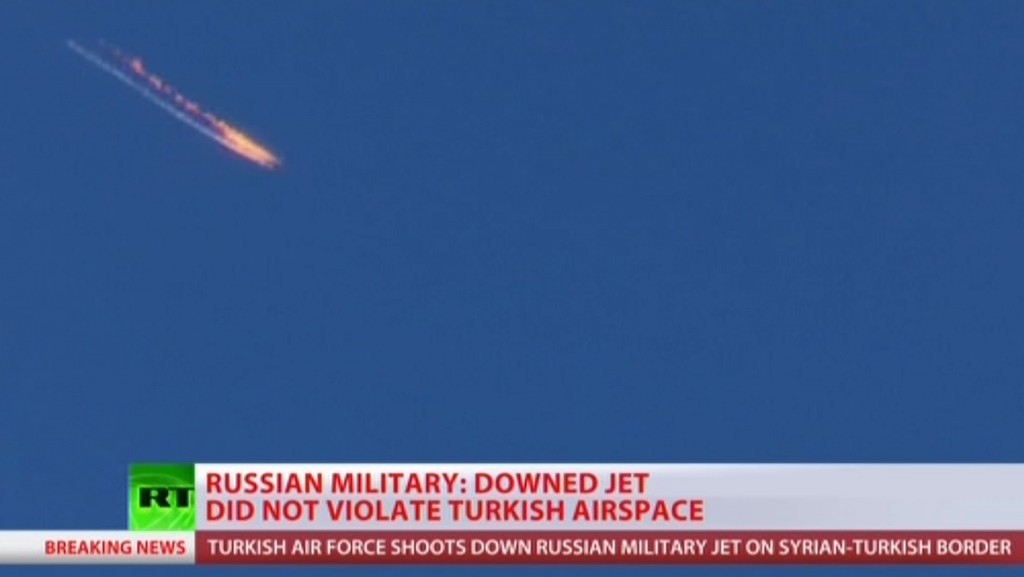
Oil jumped after Turkey shot down a Russian warplane near the border with Syria, fanning concern that conflict in the region may intensify.
Futures rose 2.7 percent in New York. President Vladimir Putin said that Turkey’s decision to shoot down a Russian Su-24 jet will have “very serious consequences” for relations. Prices advanced earlier after Saudi Arabia reiterated on Monday that it’s committed to working with OPEC members and other producers to stabilize the crude market. Gasoline surged the most since August after a fire at Mexico’s biggest refinery.
“Geopolitical worries and terrorism have had a growing impact on the market the last few weeks,” John Kilduff, a partner at Again Capital LLC, a New York-based hedge fund, said by phone. “There’s a lot of oil that travels through the region and the threat has grown. The stakes just went up and the geopolitical risk premium has reinflated.”
Oil is still trading 43 percent below its price a year ago amid signs a global glut will be prolonged as the Organization of Petroleum Exporting Countries continues to pump above its collective quota. Iranian Oil Minister Bijan Namdar Zanganeh said there isn’t a strong intention from some parts of OPEC to stabilize the market. The 12-member group meets Dec. 4 to discuss its production target.
WTI, Brent
West Texas Intermediate for January delivery climbed $1.12 to close at $42.87 a barrel on the New York Mercantile Exchange. It’s the highest settlement since Nov. 11. The volume of all futures traded was 11 percent lower than the 100-day average at 4:41 p.m.
Gains eased after the American Petroleum Institute was said to report U.S. crude supplies climbed 2.6 million barrels last week. WTI traded at $42.64 at 4:41 p.m.
Brent for January settlement increased $1.29, or 2.9 percent, to end the session at $46.12 a barrel on the London- based ICE Futures Europe exchange. The European benchmark crude closed at a $3.25 premium to WTI.
Rising futures prices helped spur a rally in energy shares, which were the best performers on the Standard & Poor’s 500 Index. Apache Corp. surged 4.2 percent to $50.91, while Marathon Oil Corp. climbed 5.5 percent to $18.50.
Saudi Statements
Saudi Arabia strives to “cooperate with all oil producers and exporters, from inside and outside of OPEC, to preserve the stability of the market and prices,” the nation’s cabinet said in a statement. Last week, Oil Minister Ali al-Naimi said the country is a reliable supplier and the nation cooperates with OPEC and countries outside the group to stabilize the market.
“If not for the Saudi statement I doubt we would be up,” Bill O’Grady, chief market strategist at Confluence Investment Management in St. Louis, which oversees $3.4 billion, said by phone. “There’s a lot of skepticism about the OPEC meeting and whether they will do anything. From my experience the Saudi’s won’t say something unless they are about to do something.”
OPEC has pumped above its collective target of 30 million barrels a day for the past 17 months, according to data compiled by Bloomberg. The group, which supplies about 40 percent of the world’s crude, will probably maintain its policy of defending market share at the meeting next week in Vienna, according to all 30 analysts surveyed by Bloomberg.
Projected Gain
U.S. crude stockpiles probably rose for a ninth week through Nov. 20, according to a Bloomberg survey before Energy Information Administration data Wednesday. That would be the longest run of gains since April and would keep supplies more than 100 million barrels above the five-year seasonal average.
Gasoline led the gains in energy. Petroleos Mexicanos said a fire at its Salina Cruz refinery is under control, according to a post on an official Twitter account. The refinery, the country’s largest, can process 330,000 barrels a day, according to data compiled by Bloomberg.
The EIA will probably report that supplies increased 950,000 barrels last week, according to the Bloomberg survey. Demand for gasoline over the four weeks ended Nov. 13 was 2 percent higher than a year earlier, EIA data show. U.S. consumption of the fuel peaks in the summer months.
“Gasoline demand has been rocking and rolling all year,” Mike Wittner, head of oil-market research in New York at Societe Generale AG, said by phone. “That doesn’t end just because the peak season is over. Demand remains pretty strong.”
Gasoline futures for December delivery increased 7.68 cents, or 5.9 percent, to close at $1.3902 a gallon. It’s the highest settlement since Nov. 4. Prices tumbled to $1.2024 on Nov. 16, the lowest since February 2009.